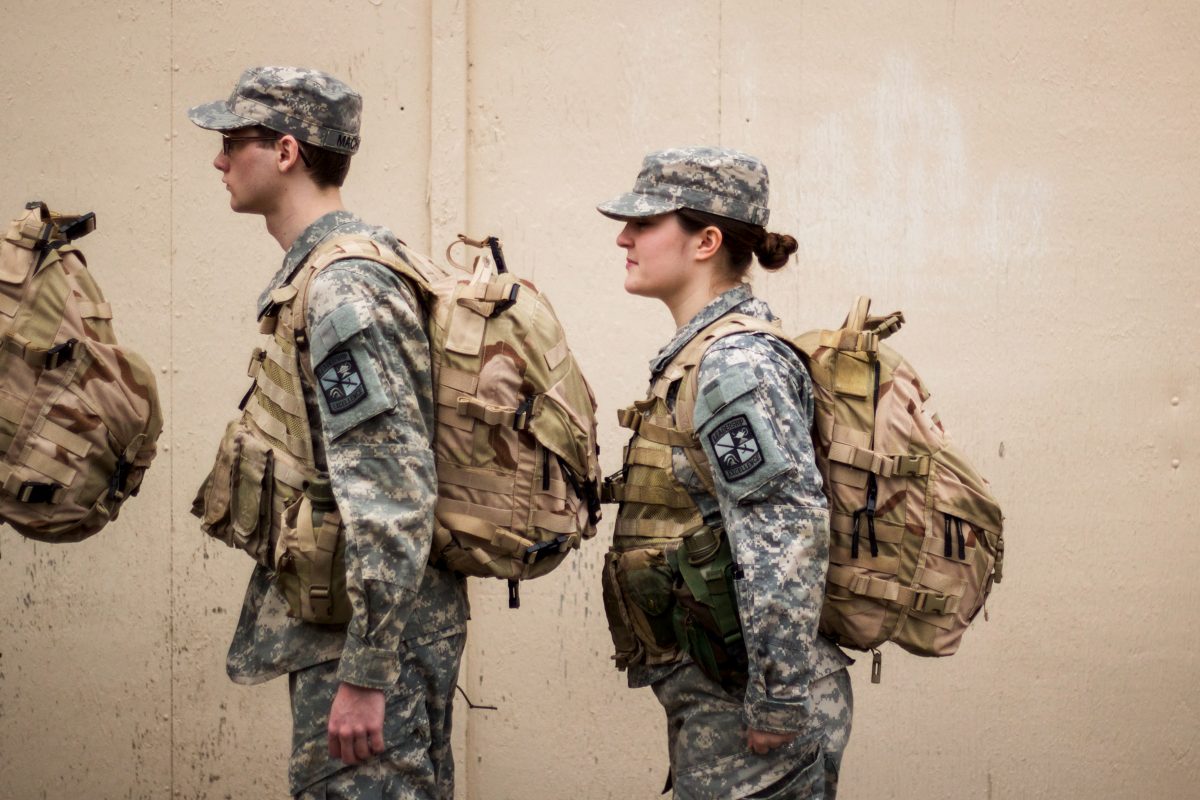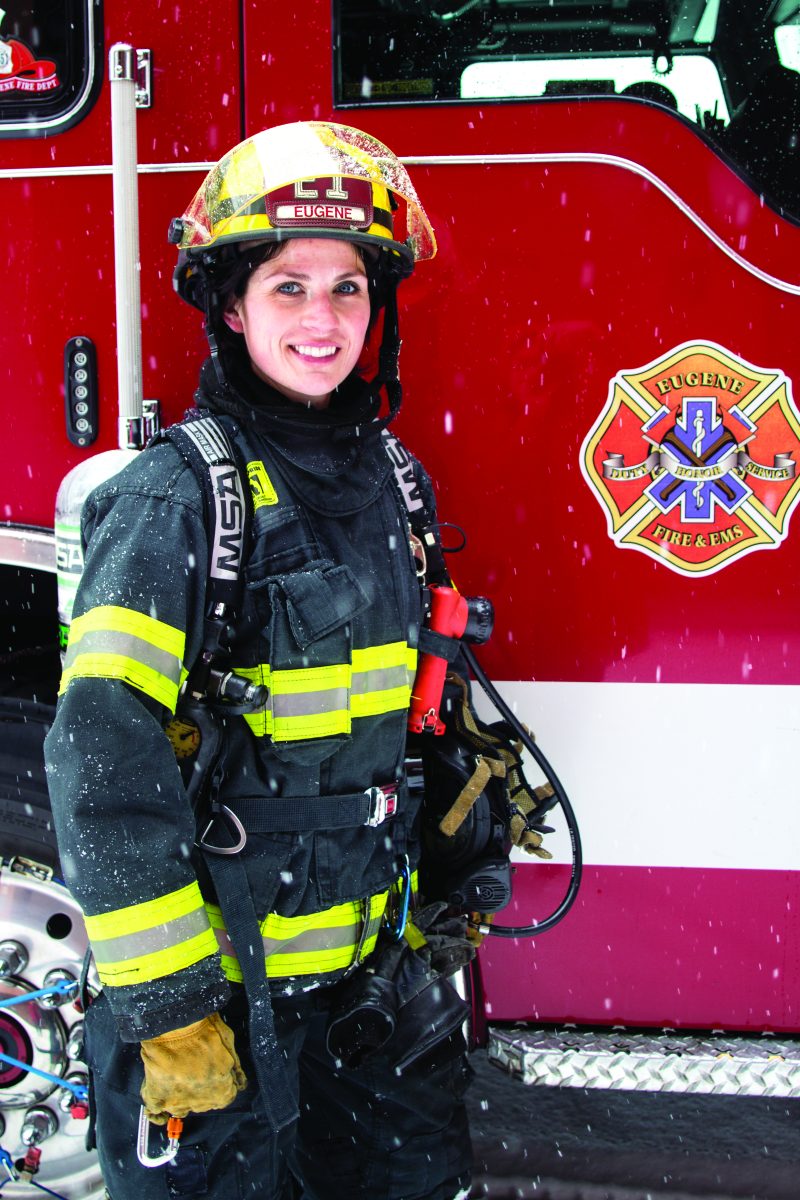Story by Emily Weisz
Photo by Tiffany Han
From the suffragettes in the 1920s to women entering the military, females have been fighting for equality. While women have come a long way in the fight for gender equality, certain stereotypes remain difficult to dissolve. Women are supposed to be homemakers, while men are supposed to be businessmen. Women have been challenging this binary gender system, aiming to break the mold of what is considered feminine and masculine. Even now, women face adversity when trying to break into male-dominated jobs, sports, and even hobbies. Women’s ski jumping was recently recognized for the first time in the Sochi Olympics, a small but powerful symbol of female ability. The media often represents women stereotypically—either as sex symbols or as housewives. Modern women are much more complex than that. Women are rightfully beginning to break the mold of gender classification and are shaping a future of indiscretion in, and out, of the work force.
Margaret Gill
Margaret “Maggie” Gill wakes up at the crack of dawn to start her day. After rolling out of bed, she quickly dresses before stepping out into the frigid morning temperatures. Steam streams out of her mouth as Gill starts her morning workout, keeping pace with the rest of the men in her class.
Gill is a sophomore at the University of Oregon and a member of the Reserved Officer Training Corps (ROTC), a program that is found on college campuses throughout the country.
Gill did not always know she wanted to be in the army. She was trying to find a way to pay for college, and ROTC seemed like a great way to achieve that goal. After receiving a brochure in the mail, she signed up and has never looked back.
“I was apprehensive about joining ROTC at first because I did not want to be seen as weak by the guys in the program,” Gill says. “Once I started training, I picked up everything pretty fast and began to prove myself.”
The first couple months were the most difficult. Only ten percent of those enrolled in ROTC are women. Though she was intimidated and outnumbered, Gill knew that she had to stay in the program and prove herself.
“Sometimes the men think we are favored as women in the program, which is extremely frustrating. They think we can bat our eyelashes and get our way, but it is our responsibility as women in the program to show that we can do everything they are doing,” Gill says.
After Gill graduates, she plans to stay in Oregon and join the National Guard to work in army hospitals. She hopes to eventually work her way into the psychology department and become a therapist.
While she faced her fair share of scrutiny when she first joined, Gill has learned things she would have never learned outside of ROTC. “It really helps women break mental and physical barriers,” Gill says.
Smiling from ear to ear, Gill exclaims that five women joined this year as members of the freshman class. She expects this number to grow every year as more and more women are becoming interested in the benefits ROTC offers.
“For women that may be scared to join a male dominated field, don’t be. The men are not that scary and in the end, and even if they are in the beginning, they will respect you for the work you have done,” Gill says.
Krista Buck
Krista Buck has been riding motocross since she was 11. At an age when many girls were asking their parents for dolls, Buck asked for a bike so that she could compete with her cousin.
A typical training day for Buck begins at six in the morning, when she loads all of her gear into a truck and drives an hour to the track. Once she arrives, Buck rides her bike for hours, until she is physically unable to ride any longer. Due to the rough terrain and the sheer power of a motorbike, motocross is a physically demanding sport, regardless of gender.
“One big obstacle I have faced is that women are not taken seriously for a number of reasons. There are not as many women riders as there are men. So when a woman wins the women’s class, no one seems to care,” Buck says. With only five or six women competing at a time, it does not seem as such a big victory as when the boys beat out dozens of rivals. Underrepresentation is one of the sport’s most obvious problems. It is much harder for women to gain respect when there isn’t a lot of competition.
“Another challenge that most women face in this sport are the girls who pose in bikinis with bikes saying that they ride,” Buck says. “Women are overlooked in the sport because a group of them care more about how they look with their bikes than they do actually riding them. Which means the girls who take the sport seriously are affected because no one will take them seriously.”
Buck has overcome these roadblocks by occasionally racing with men, which shows that she can compete with anybody. Her riding speaks for itself, showing other racers and sponsors that she should be taken seriously.
While the sport is still dominated by men, Buck has seen more girls entering motocross in recent years. “I think more women are starting to ride because even with the girls posing in bikinis, there are a lot of positive role models who are making a good name for the women out there,” Buck says. “There are a lot of organizations and Facebook pages and groups that are supporting women riders and I think that’s part of the reason it’s growing.”
Britni Green
Like Gill and Buck, Britni Green sees her job as something that should be defined by passion, not gender. As a female firefighter, Green has used her drive and determination to solidify her place in the heavily male-dominated professions of firefighting and paramedic treatment.
Green has worked as both a firefighter and paramedic in Eugene since 2008. She didn’t always want to be a firefighter, but once she was exposed to the profession in high school, she decided to try it out.
While Green’s parents did not push her to pursue a certain career path, they always told her that she could get any job she wanted if she worked hard for it. Though she didn’t know it when she entered the field, firefighting runs in her family. Green discovered this when her grandfather died, and her father gave her his badge.
Green’s job has taught her to live for every moment. As a firefighter and paramedic, Green has seen people in some of their hardest times and dangerous situations.
Her gear is heavy, and the work can be hellish, but it doesn’t matter to Green. Her self-proclaimed stubbornness works to her advantage, and she does not allow herself to give up until she finds a solution.
“I like that it’s a challenge, that it’s not something you can expect to get without any effort. You have to want this job, have the desire to give everything you have to make sure you succeed,” Green says. “It’s physical, it’s mental, and it’s emotional. It hits you at every level of yourself. You can make a positive difference in possibly one of the darkest, most frightening times of a person’s life.”
Green does not want any special treatment because she is a woman. She has worked hard to earn her post, so she wants to be treated as a strong contributor and not as just an ordinary worker. While there may be instances when she has to adjust because of her petite frame, she considers it just another challenge.
It is extremely important to Green that she breaks the female stereotype and is just seen as a firefighter and not a female firefighter. “People can, and will, stereotype anything. It is up to an individual to step out of the bounds of narrow minds, to stride and succeed in anything they want regardless of what the normal is,” Green says.
Britni Green has been working as a firefighter and paramedic in Eugene since 2008. Green is seen here wearing turnouts, appropriately named due to the nature of the clothes being turned inside out when not being used so the firefighter can quickly and easily step into them.









